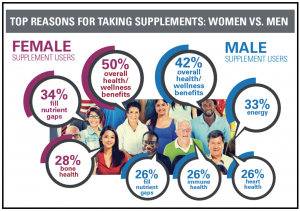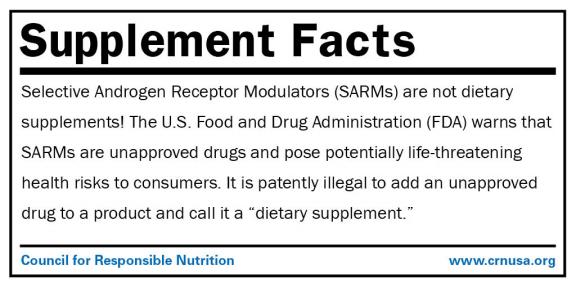A topline report from the Council for Responsible Nutrition (CRN),
the leading trade association for the dietary supplement and functional food industry
Supplement OWL registry celebrates first year of growth
RETAILERS TAKE NOTE: April marks the one year anniversary of the Supplement OWL (Online Wellness Library), the dietary supplement product registry. Launched by CRN and UL one year ago, this self-regulatory initiative is experiencing exponential growth and enthusiasm throughout the industry with already more than 10,000 supplement labels either visible or in process. With new labels being uploaded each month and several major retailers participating, the Supplement OWL is realizing the promise as the go-to resource for audiences looking to identify supplement products, their ingredients, and the companies who market them.
In addition to including store brands, the Supplement OWL also offers retailers access to a wealth of information to help them make more informed decisions when determining which products they have confidence placing on their store shelves. The registry also offers retailers the ability to access additional information and supporting documents about quality practices and certifications of products, once being granted permission by the product manufacturer. For more information, contact CRN’s Gisele Atkinson at GAtkinson@crnusa.org.
CRN defends consumer access to fish oil supplements
 The battle to protect consumer (and retail) access to omega-3 fish oil supplements continues as CRN defends these products against an effort to restrict esterified EPA fish oils to prescription drugs. The drug company Amarin Pharma Inc. has appealed the International Trade Commission’s (ITC) decision not to investigate its complaint against 20 fish oil supplement producers. In an amicus brief jointly filed with the Global Organization for EPA and DHA Omega-3s (GOED), CRN argued that Amarin would require ITC to inject itself into the statutory and regulatory framework explicitly authorized to the Food and Drug Administration (FDA). Amarin “did not, and could not, allege that the concentrated fish oil products accused were not, in fact, dietary supplements under any objective standard or ruling,” wrote CRN. Amarin’s latest appeal is further evidence of a pharmaceutical company seeking a drug monopoly on fish oil products.
The battle to protect consumer (and retail) access to omega-3 fish oil supplements continues as CRN defends these products against an effort to restrict esterified EPA fish oils to prescription drugs. The drug company Amarin Pharma Inc. has appealed the International Trade Commission’s (ITC) decision not to investigate its complaint against 20 fish oil supplement producers. In an amicus brief jointly filed with the Global Organization for EPA and DHA Omega-3s (GOED), CRN argued that Amarin would require ITC to inject itself into the statutory and regulatory framework explicitly authorized to the Food and Drug Administration (FDA). Amarin “did not, and could not, allege that the concentrated fish oil products accused were not, in fact, dietary supplements under any objective standard or ruling,” wrote CRN. Amarin’s latest appeal is further evidence of a pharmaceutical company seeking a drug monopoly on fish oil products.
Two new studies on protein and calcium deserve scrutiny, not panic, says CRN
 CRN criticized sensational conclusions presented in a new report from the Clean Label Project (CLP), which claimed close to one third of the protein powder products it tested contained heavy metals and contaminants at higher than acceptable levels. While the report identified elevated levels of lead, mercury, cadmium, arsenic, or BPA in 53 of the 134 protein powder brands, CRN reminds consumers and retailers that “a detectable level of a contaminant is not necessarily an unsafe level—it merely means that the instrumentation is sophisticated enough to detect it.”
CRN criticized sensational conclusions presented in a new report from the Clean Label Project (CLP), which claimed close to one third of the protein powder products it tested contained heavy metals and contaminants at higher than acceptable levels. While the report identified elevated levels of lead, mercury, cadmium, arsenic, or BPA in 53 of the 134 protein powder brands, CRN reminds consumers and retailers that “a detectable level of a contaminant is not necessarily an unsafe level—it merely means that the instrumentation is sophisticated enough to detect it.”
Additionally, CRN promptly responded to a new study that concluded calcium supplementation and the combination of calcium and vitamin D may increase the risk of a specific type of colon polyps. CRN expressed surprise about these results, as previous research indicates calcium supplementation may have a protective effect against colorectal polyps. CRN cautioned consumers and the medical community to avoid haphazardly dismissing or downplaying the value of calcium supplementation, particularly in people most likely to develop osteoporosis or bone loss, until more research is conducted.
New infographics bring consumer stats to life
Looking for an easy way to share consumer data on supplement usage with your customers? For the fifth consecutive year, CRN has released dynamic infographics highlighting new data from its annual Consumer Survey on Dietary Supplements.  The easy to follow infographics feature overall dietary supplement usage across various demographics, including the types of supplements consumers are taking, why they take them, and more! Retailers can share these consumer facts online, through their social media channels, or in print. Click here to download.
The easy to follow infographics feature overall dietary supplement usage across various demographics, including the types of supplements consumers are taking, why they take them, and more! Retailers can share these consumer facts online, through their social media channels, or in print. Click here to download.
Congressional briefing takes closer look at sports nutrition supplements
“Dietary supplements support the foundations of  optimal fitness,” said Chris D’Adamo, Ph.D., assistant professor, University of Maryland School of Medicine, and director of research, Center for Integrative Medicine, at a Congressional Dietary Supplement Caucus (DSC) briefing, held last month on Capitol Hill. Speaking to nearly 100 Congressional staffers and guests, Dr. D’Adamo, a nationally-recognized nutrition research expert, presented a scientific perspective on advancements in sports nutrition and the role supplements play in optimal health and wellness.
optimal fitness,” said Chris D’Adamo, Ph.D., assistant professor, University of Maryland School of Medicine, and director of research, Center for Integrative Medicine, at a Congressional Dietary Supplement Caucus (DSC) briefing, held last month on Capitol Hill. Speaking to nearly 100 Congressional staffers and guests, Dr. D’Adamo, a nationally-recognized nutrition research expert, presented a scientific perspective on advancements in sports nutrition and the role supplements play in optimal health and wellness.
Dr. D’Adamo’s presentation aligns closely with CRN’s efforts on behalf of responsible industry to raise awareness of the dangers of Selective Androgen Receptor Modulators (SARMs). CRN recently launched a new consumer education initiative, #SARMsCanHarm, to spread educational information on SARMs and tips for how athletes can protect themselves from products containing these illicit ingredients.
 Short and Tweet
Short and Tweet
Know your #SupplementFacts



